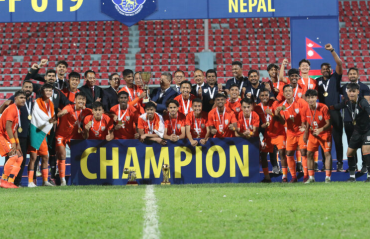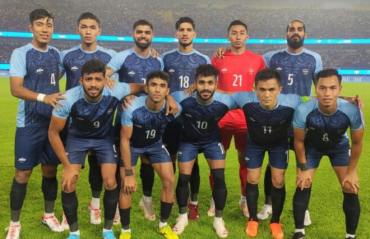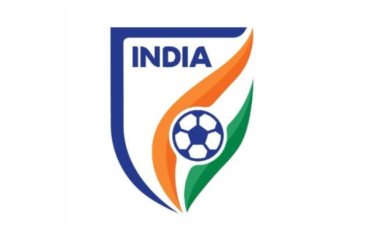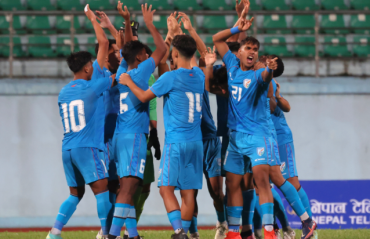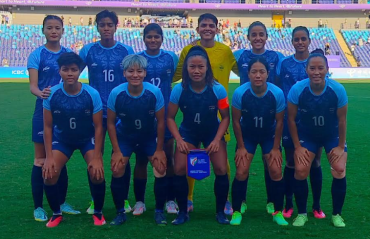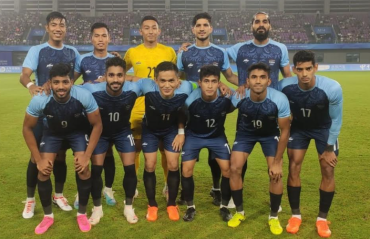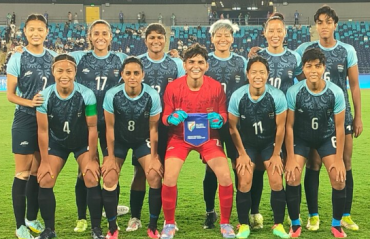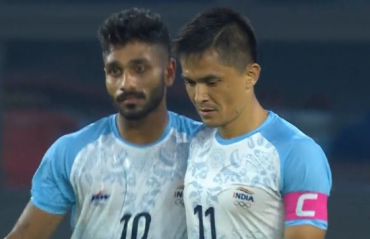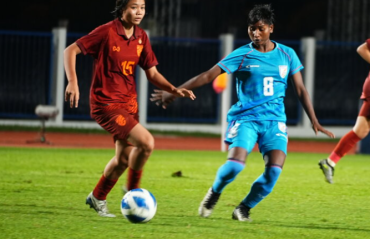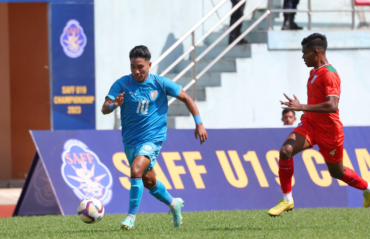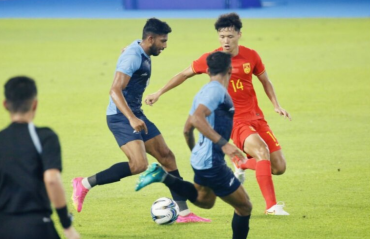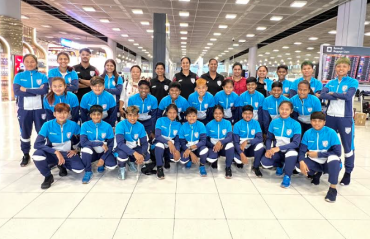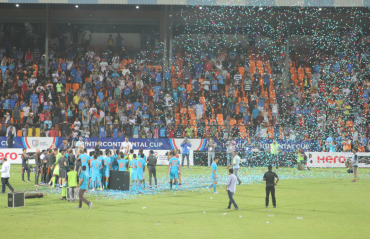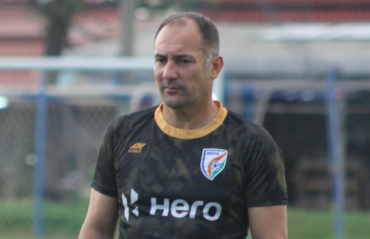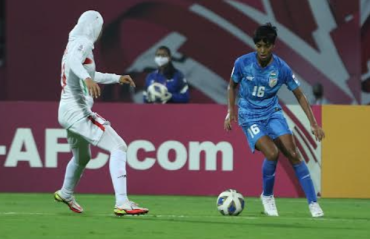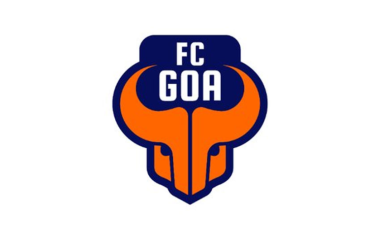SUNBURNT TERRACE - No meaningful change is happening in AIFF, Indian football risked a FIFA ban for nothing
- By Chiranjit Ojha

- August 13, 2022

Aap chronology samjhiye.
In December 2020, former AIFF President Praful Patel's term in the office ended. He chose not to leave office, citing the pandemic and the still ongoing case regarding the new AIFF Constitution.
FIFA didn't do anything. With the world still grappling with lockdowns, deaths and cancelled football matches, they had bigger fish to fry.
Then the matter went to the Court. A petition was filed, the case was heard, and by judicial intervention the AIFF administration was disbanded. The Supreme Court appointed a Committee of Administrators (CoA) who would finalise the new AIFF constitution and finally hold the long delayed elections.
Now, FIFA started taking an interest in the matter.
That should tell you two things:
1) FIFA doesn't like government or judicial meddling in football affairs (At least overtly); all of which they file under the umbrella term "third party interference"
2) FIFA's aim is not to clean up AIFF. If that was the case they would have gotten involved when the election was delayed and the previous President overstayed his term.
Aap chronology samjhiye.
FIFA and AFC sent their joint delegation to India in June. There was a lot of speculation that they might ban AIFF over this "third party interference." But they didn't. They gave the CoA a set deadline: get the elections done by mid September, or we'll ban you.
Now, here we must again clear up a couple of matters:
1) There was a perception among a lot of fans that since FIFA did not immediately ban India, that must mean they agree with the Supreme Court's decision to bring in the CoA. That's not the case at all. They still saw the CoA as a third party. They just delayed the ban; a diplomatic move to solve the situation without things getting ugly.
2) The temporary stay on the ban was based on multiple conditions. Notable among them were...
a) The CoA must send documents related to the new AIFF constitution on a daily basis to FIFA and AFC.
b) The CoA can't unilaterally propose new rules or changes to the AIFF constitution. Each new proposed rule must be approved by FIFA and AFC as well as the AIFF General Body before it's presented to the Supreme Court.
The second condition is going to play a crucial role in our story. Because the CoA would then proceed to break this condition, pick a fight with FIFA that can't be won, and basically put India at risk of getting banned from international football.
It's not a hyperbole. The CoA literally picked a fight they had no way to win.
Before we get into the drama let's first understand where FIFA/AFC and the CoA had their points of disagreement; of which there were many. But for our purposes, we need to focus on only two.
1) The CoA wanted to introduce "term limits" for AIFF Executive Committee members, including the President. Anyone who had served 2 terms would be ineligible for another term. FIFA said they wanted the term limit to be non-retroactive,
"It is our opinion that such provision should be added to ensure any previous term already fulfilled by any Executive Committee Members are not taken into account in calculating the maximum number of terms."
So everyone who has already served 2 terms or more, they all get to start with a clean slate and go for 2 more terms.
2) The CoA wanted to bring in voting rights for Eminent Players; aka former international players who have retired at least 2 years ago. There would be one such player from each state; initially nominated by state FA but later elected by his or her fellow Eminent Players. They would also vote in the AIFF Executive Committee elections; effectively doubling the total votes, and creating a parallel electorate that was just as powerful as the Member Associations (states, union territories etc).
On paper it's an interesting idea. It would decentralise the electoral power and give former players a direct voice in how the sport is run. The National Sports Code allows for a rule like this, so the Supreme Court would also have no objection to it.
But guess who had an objection: FIFA. They wrote,
"Although we agree that the players’ voice needs to be heard, we are also of the view that the importance of the existing members of the AIFF should not be undermined. To bring in 50 percent of the members in the Congress structure which equals the current membership structure is not prudent idea, and the AIFF should seek to be more diverse in future. However, we understand the requirements of the Sports Code of India and recommend AIFF to bring in a presence of above 25 percent of the Eminent Players in the AIFF Executive Committee as Co-opted Members."
FIFA opposed the idea of players having a direct vote. Their own Statutes don't have a provision for it, and they have not allowed this system to be implemented in any country.
This created a catch-22 situation, since the Supreme Court was involved. The AIFF, as an Indian organisation, are bound by law to follow whatever the Court said. But FIFA are not based in India, and they don't have to agree to any Court order that contradicts their own rules.
So what's the natural outcome of this situation? A ban on India.
Presumably, the people behind the CoA understood this. And they were sent polite reminders from FIFA/AFC in multiple official letters; including the ones on 6th July and 25th July. They knew they had a deadline to meet - the Statutes in the new AIFF constitution were to be approved by the AIFF General Body by 31st July, and then sent to FIFA and AFC for their approval. Only then, as per the agreement in June, the CoA would be allowed to bring these Statutes to the Supreme Court for final approval.
The deadline came and went. The CoA did not even call an assembly of the AIFF Congress to approve the Statutes. On 3rd August, they unilaterally presented the new Statutes, including the famous Eminent Player voting rule, to the Supreme Court and the Court approved them.
On 5th August, FIFA and AFC shot a jointly written letter to AIFF; a dark foreboding of an impending ban unless there was a quick reversal of the proceedings.
And this is where we have a kahaani mein twist.
The CoA, on 6th August, wrote back to AFC and FIFA in a letter that read more like a manifesto than an official response. They did not respond directly to the accusation that they had broken the agreement they themselves had made in June. But the real headline-maker in the letter was the allegation that FIFA was actually doing all this because former AIFF President Praful Patel, a sitting FIFA Council member, was telling them to do it.
It's a grave allegation. As evidence, the CoA mentioned they possessed a video recording of a Zoom meeting of state associations, where Praful Patel participated.
Is the allegation true? It may be. But the bigger question is: will FIFA care? The answer is, no.
Remember, FIFA thinks of the CoA itself as a third party and any of its rules would only be seen by the world football body as valid once the AIFF General Body has voted to approve them. That's why all the official communication from FIFA and AFC have been directed to Sunando Dhar, the acting General Secretary of AIFF; and not the CoA themselves. So while the CoA's accusation is of great consequence to the Supreme Court, for FIFA it's not even something that needs to be taken into account. So we're back to the catch-22.
If that seems unfair, that's because it is. Welcome to world football politics.
Was the CoA not aware that this was not going to be a fair fight? That this was not going to be a repeat of the BCCI-ICC situation where the richest domestic association could make the international body bend to its will?
They likely did. But they went ahead with it anyway. The question is - why?
Here's a hypothesis: the people behind the CoA knew that their new changes, especially the Eminent Player vote, would not be approved by the AIFF Congress. Because the majority of state associations would never vote to dilute their own power. And FIFA's position on the matter provided them with the perfect justification.
So the CoA decided to go rogue. They wanted to get the Eminent Player rule passed by the Supreme Court directly so that the next time the AIFF General Body met, the state associations would not be the sole block. The theory was that the natural course of politics would take over and with several factions warring over the votes of these Eminent Players, the question of abolishing their right to vote would never get majority support again.
There was, of course, the tiny issue of FIFA refusing to recognize the new election and banning India. But perhaps they wouldn't? How could they ban the country that was going to host the FIFA U-17 Women's World Cup, right? And even if they did, isn't that an acceptable price to pay to clean up the rotten system within the AIFF?
But the gambit was based on false assumptions. For one, FIFA do not care if India fail to host the U-17 Women's World Cup. In fact they already have 2-3 prospective hosts ready to step in. The search for potential replacements began the moment the CoA took charge.
India is potentially a big market for FIFA and they want to develop it. They have spent a lot of money in developing football stadiums and other infrastructure in this country. But that's not an unconditional offering. FIFA want control of this market. And if they have other authorities dictating terms of football administration in a large market like this, that turns India from a cash cow into a threat to FIFA's global control over the sport.
So there's no scenario where they loosen their grip over the AIFF; regardless of what Praful Patel says they should do.
They were not bluffing when they said they would ban India. If that meant tanking their investment into the Indian market, they would do it. That money is peanuts to FIFA compared to the risk of having an out-of-control India slowly increasing its influence over world football.
Basically, India was risking a ban over nothing. And a FIFA ban is nothing to be toyed with.
In 1954, India submitted the application to play in FIFA World Cup Qualifiers past the deadline. So FIFA did not let them participate. The AIFF perhaps got miffed by that snub and in their high wisdom, did not even enter the World Cup Qualifiers for the next 32 years.
Those 32 years are known in Indian football history as the period of decline. India peaked at the Asian Games of 1962. And from there, it was a straight downward spiral. For over 2 decades straight during that period we did not play a single match with a nation from outside Asia. Even though initially we were one of the biggest powerhouses in Asia, we didn't play in the World Cup qualifiers; so teams from other continents had nothing to gain by playing us.
There were many reasons that contributed to Indian football's decline. But loss of quality due to lack of global exposure was definitely one of the major ones.
So if not playing non-Asian countries had such a major impact on the quality of Indian football, then what will happen if we stop playing other countries altogether?
Unlike cricket, football is a true global sport. You can't grow in a bubble.
Not to mention our junior teams will get decimated if we face a 2-3 year ban. That's a generation lost right there. The repercussions of something like this will be felt for the next 15-odd years.
If anyone wants to see an early preview of what awaits India post a FIFA ban, take a look at how Pakistan Football Federation is scrambling to re-build its national teams. And they have the luxury of picking players who hold foreign passports; which AIFF doesn't.
Those who flippantly say India should get banned to teach the AIFF Establishment a lesson, are cutting off a nose to spite the face. FIFA can play this blinking game all day long.
So... here we are. With no real possibility of meaningful change in the AIFF. Just a ton of potential downsite.
And we can reach that assessment not from what's in the proposed new AIFF constitution, but from what isn't.
What was the single biggest rule in the new BCCI constitution that was hailed as a major reform? It banned active politicians from holding big offices in the Indian cricket board.
The new AIFF constitution doesn't have that rule. Sources say it was proposed, discussed but ultimately not adopted.
Couple that with the previously mentioned position of FIFA that term limits should be "non-retroactive" and it basically means that someone like Praful Patel can run for the AIFF President post again.
But he's no longer the lone big politician in the Indian football arena. Sarbananda Sonowal, the sitting Cabinet Minister of Ports, Shipping and Waterways as well as AYUSH in the central government, is also considering running to be the new AIFF President and he has a bunch of state associations already on board to support his candidacy.
Some of those state associations were represented in the aforementioned controversial Zoom meeting with Praful Patel.
Aap chronology samjhiye.
So, the single biggest reform Indian football fans hoped to gain from the CoA - ridding the AIFF of political influence and politicians in general - is not even being attempted by those who are behind the CoA.
Indian football will have way, way more politics going forward, not less.
And if, God forbid, India get banned by FIFA, it will further consolidate the political lobbies' power in AIFF. Because from the state associations' perspective, as long as the politicians were in charge, at least Indian football was still somewhat functional, whereas a few months without them led to the biggest disaster in Indian football history since the 1950s.
This column has discussed the question of how to bring true reform in AIFF before. The conclusion was that fans should become active in the business of the state associations; support local clubs and state teams, show up at loccal league matches, and use the clubs as their mouthpiece to influence the decision making of the states.
It's not an easy undertaking. It may take decades. But it's the only viable solution. While the instant dopamine hit of upturning the system via a FIFA ban may seem appealing, it does not actually lead to the changes fans desire.
The rot in AIFF's system is deep and complex. The fix will have to be the same.
Think of it as a really difficult medical procedure. The doctors must exercise caution and take their time to operate on the patient. Doing anything rash will just kill the patient.
And that's not something we should risk happening to the sport we love.
UPDATE: Just 1 day after this article was published, on 14th August 2022, FIFA suspended the AIFF. Reacting to this and following government intervention, the Supreme Court decided to abolish the CoA. On 25th August, satisfied that third party interference had ceased, FIFA lifted the suspension, bringing this whole sordid affair to an end.
Get the latest in the world of Sports, Teams, and Players! Free Delivery to your Inbox.









